


CHAPTER 1: MENDELSSOHN FAMILY PART 1
CHAPTER 2: MENDELSSOHN FAMILY PART 2
CHAPTER 6: THE STORY OF MORRIS (DE SAXE)

Many people have contributed to the information on this page, helping to build up this Emanuel family history, and I will try and list them all. If I have left any person or people out, it is inadvertent and I hope they will advise me accordingly. Thank you:
Australian Jewish Historical Society - Beverley Davis
National Library of Australia
National Library of New Zealand
Cedric Emanuel
Llane Hadden
Ann Mitchell
Dulcie Penfold
John Emanuel


Emanuel (Menachem Mendl) Emanuel, born c1781 (died 1 August 1856 in London), married Julia Rebecca, born c 1778, (died 26 December 1854 in London)(surname unknown).
The records available show they had three sons.
There seem to be few records at this stage (1 April 2007) of the first, Simon Emanuel other than that there were three children, Louis, Jeanette and Edward.
The second, Abraham Emanuel (described as Professor of Music) was born on 30 January 1814 and died in Melbourne on 6 May 1907. He married Elizabeth Abrahams, born on 16 July 1818 (daughter of Moses and Betsy) in London on 10 May 1836, and she died and was buried in Ballarat, Victoria, on 22 March 1872.


The third, Jacob (John) (described as Surgeon Dentist) was born c 1817 and died in Sydney on 8 July 1882. He arrived in Sydney before 1843 on the Bencoolin. He married twice, firstly Caroline Abrahams born c1826(daughter of Abraham and Elizabeth) on 26 April 1843 in Sydney (she died in Sydney on 5 December 1855), and secondly Rosetta Sloman in Sydney on 3 June 1857. There were two children from the first marriage and unrecorded issue from the second.
As I am directly descended from the seventh (Caroline) of Abraham and Elizabeths 8 children (the 8th was a stillborn daughter on 12 September 1852) I will focus on this branch of the Emanuel family.
Abraham and Elizabeth's children were:
Emanuel, born 14 May 1837 in England, married Susan (Allyer), born c1844, in Sydney 5 March 1866Caroline and Emanuel had six children, and details of these children are on the Mendelssohn pages:
CHAPTER 1 MENDELSSOHN FAMILY PART1
CHAPTER 2 MENDELSSOHN FAMILY PART 2

This is Caroline Emanuels story, or as much of it as I have been able to put together. I am Carolines great-grandson Mannie De Saxe (Emanuel) presumably named after Carolines husband Emanuel Mendelssohn, but there is also the link with Carolines surname. I wrote much of this story in 1987, and will add items to it as they may come to light. This started being posted on my web pages in 2007, 20 years later, and now in 2013 I am able to post some concert reviews which I have found which are archived in the National Library of Australia

Caroline Emanuel was born in Elizabeth Street North in Sydney on 8 May 1849, according to the birth announcement in the Sydney Morning Herald a few days later. Her parents, Abraham and Elizabeth had arrived in Sydney from the UK on the barque Psyche on 11 June 1841 with two children. Caroline was the seventh to be born to them.
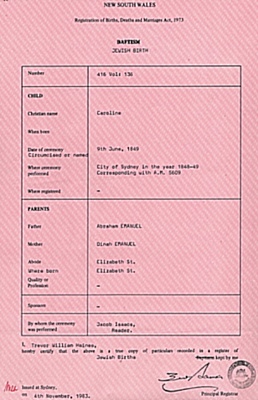
Abraham was called, or called himself, a Professor of Music, and obviously gave music lessons, probably on the piano, and Elizabeth established a Ladies Academy, first at 4 Bridge Street and later at 8 Bridge Street, Sydney. This must have been an astonishing achievement, because during the period 1841 to 1849 she gave birth to 5 children!
Some years later, probably in the early 1860s, the family moved to Ballarat, no doubt attracted to the area by the gold rush and the promise of a new and richer life in a fast developing area. Elizabeth died in Ballarat on 22 March 1872.

29 MARCH 1873





19 APRIL 1873




30 APRIL 1873




5 AUGUST 1873
Review in The Argus, Melbourne, 5 August 1873
Information stored by the National Library of Australia at: http://trove.nla.gov.au/ndp/del/article/5868703
The pressing needs of the English operatic stage in this place for leading singers are being recognised in various directions of late. Miss Carrie Emanuel is the latest claimant for the place of prima donna, and she showed by her performance last night that she was possessed of some of the qualifications which should command success.
Balfe's opera " The Rose of Castile" was the work selected for her first appearance, and it is reasonable to sup- pose that this was done at the debutante's own desire. If it were so it showed great self-reliance on the part of the young lady, because much of the music is of a very florid kind, and at the same time it is uncommon, as compared with that usually affected by English singers, on account of the local colour with which the ingenious composer has invested it.
Miss Emanuel is quite young, very self possessed, has a light soprano voice of good compass and natura flexibility, which she used with good effect on this occasion, and will doubtless use still more effectively when study and practice, and familiarity with the business of the stage, shall have taught her how to employ her best powers. As far as can be fairly said of a young singer who makes her first appearance on the operatic stage, her voice is hard in the middle and lower notes, and as it is least powerful in these parts, it is likely that the practice which she must necessarily undertake will sweeten the tone, while it improves the volume of that part of her vocal register. In the upper notes her voice is singularly pure and sympathetic, and possesses power, which, under the circumstances of a first appearance, are evidence that she possesses a naturally fine organ.
The "scherzo" movement, with chorus, in the first scene, which all who know the opera will remember is a very difficult piece of vocalisation, was given by Miss Emanuel in such a manner as to convince the audience that the young dbutante was a genuine vocalist, and to secure from that time their good will throughout the whole of the performance. In the rondo ' Oh, were I the Queen of Spain' she received a well-merited encore for her execution of the elaborate and highly ornate passages by which that composition is chiefly characterised.
We mention another instance which is entirely different in construction from either of tho two just named, namely, the elegant ballad "The Convent Bell '. In her performance of this number Miss Emanuel showed as much aptitude for the cantabile as for the bravura style of singing, and won the approval of the critical as well as of the friendly disposed amongst the audience - and let it here be mentioned, these last-named were very numerous indeed.
One more instance of this young vocalist's manner, and then we shall have given the reader as much of an outline as can be expected when the occasion and its drawbacks are taken into consideration.
In the passage with the three conspirators wherein Elvira, disguised, sings " I'm but a simple peasant maid," Miss Emanuel made free use of that very beautiful musical ornament, the "shake". This she delivers with perfect purity of execution and most charming effect whenever she uses her voice "piano" or even "mezzo voce;" but the effect is strident and harsh when she introduces it with the full power of her middle tones. Her voice lacks power at present for colloquial stage purposes, and she has yet much to learn in connexion with elocution and stage bearing. Her first appearance was a success, but yet she is only in the position of a learner.
From such a beginning as she has made we may fairly expect future performances of much greater merit, if her studies are pursued under good guidance, and if she will be content to think that she has not mastered all the difficulties of her art at the outset.
The same performance will be repeated tonight.

23 DECEMBER 1873




In 1874 Caroline married Emanuel Mendelssohn in Melbourne. According to some available records, Emanuel Mendelssohn was shipwrecked off the coast of Australia, with two brothers who died. He was born in Pakosch, East Prussia, now part of Posen, Poland, but seems to have been imbued with the spirit of adventure from an early age, because after marrying Caroline, they moved from place to place and country to country. Their second daughter, Paulina, my grandmother, for instance, was born in Brisbane in 1877.
One of the stories about Caroline and Emanuel suggests that they met in Berlin when Caroline may have been studying singing there. I have yet to confirm this story.

19 FEBRUARY 1876




11 MARCH 1876




18 MARCH 1876
Information stored by the National Library of Australia at: http://trove.nla.gov.au/ndp/del/article/1398772#pstart68755"
Review in the Brisbane Courier, Saturday, 18 MARCH 1876
At Madame Mendelssohn's concert at the School of Arts last night there was a very fair attendance. Tho front seats and gallery were pretty fully occupied, but there was a con- siderable vacuum at the back part ot the hall. That the hall was not filled may perhaps be due to the circumstance that many persons were under thc impression that Madame Mendelssohn proposed to give the concert with the sole assistance of Mr. Atkinson as accompanist, as no other musicians were advertised to take part.
This was a mistake on the part of the management, as it is probable that the announcement of Madame Mallalieu - a musician, to say the least, as proficient on the instrument she professes as is the concert-giver as a vocalist - of Mrs. Wilkie, whose pleasant voice has many admirers, and of the brothers Quin, would have served to fill up the hall.
The concert was opened by Rossini's overture to " La Gazza Ladra," played as a trio by Messrs. Atkinson and F. and A. Quin. A little additional vivacity of tempo would have increased the acceptability of this number, which was, nevertheless, otherwise well played.
Madame Mendelssohn followed, and was received with considerable applause on making her appearance to sing "Ernani involami." It was at once apparent that the singer was not in so good voice as at her first concert, and consequently, although very hearty applause marked the conclusion of the selection, she failed to make so pronounced an impression as on the former occasion. To this variability of voice every singer is more or less subject, and we should be disposed to range Madame Mendelssohn, judging by the quality and timbre of her voice, among the more robust artistes, so that there is every probability that, on her next appearance, she will be again heard at her best.
Indeed, later in the evening, sho had recovered considerably, and "Sing, sweet Bird," was famously executed.
We think Madame Mendelssohn has some title to term this her specialty, for she certainly is extremely happy in her rendering of it, the bird or cuckoo effect being particularly effectively brought out by her.
An irresistible encore followed the conclusion of this song, and was acknowledged by a repetition of a verse, bel Raggio, from " Semiramide," with an obligato accompaniment for the flute, very effectively played by a gentleman amateur well known as a proficient on that instrument, produced an encore strongly insisted on but declined, the cantatrice being doubtless sensible that she was not at her best.
The opening recitative was, however, reudered in a most artistic fashion, and many of the passages - terribly trying as they are - were brilliantly sung. A certain amount of laxness was noticeable in a few of the smoother runs, which indeed demand that an artiste should be thoroughly nerved to prevent smoothness from degenerating into indistinctness. In addition to these selections, Madame Mendelssohn sang the ballad, " Come back to Erin," which evoked a strong expression of pleasure from a contingent of celebrants of St. Patrick's Day.
Madame Mallalieu played with even more than her accustomed brilliancy Benedict's "Erin," and a " Grand Polka de Concert," by Wallace. In fact it has been apparent to us at the last two concerts that this lady, of whom we had heard too little for some time previous, is not content to stand still. Always, within our recollection, an excellent pianiste, it becomes apparent that she is not only an artiste but a student. Her powers of execution have certainly expanded of late ; and paraphrasing a well-known expression, we may advise parents of young pianistes that for them to hear her is, in a musical sense, a liberal education.
Madame Mallalieu also took part with the Messrs. Quin in two trios. Of these a selection of airs from "Lucia" was excellent, and met with marked favor, aud the second, though not of so popular a cast, was not less in merit as regarded the performance of it.
Both the Messrs. Quin played with much steadiness, and the younger brother made his - we believe - first appearance os a solo violinist on this occasion. He essayed a selection of Irish melodies, effectively arranged and varied, by Farmer, aud played so well that we are confident he will be welcomed on any future occasion. Mr. Quin appears to be gifted with a natural capacity for imparting feeling to what he plays, has ample volume of tone and promising execution. A slight uncertainty of intonation marks his extreme upper notes, but with greater practice, for which his youth allows ample time, this will be remedied.
Mrs. Wilkie sang with much taste a ballad, " Patrick, My Love," for which her sympathetic quality of voice was well adapted ; and also, " It was a Dream," which she rendered with admirable delicacy. The only other song was the " Heart bowed down," by a gentleman amateur, whose voice and style were scarcely equal to its efficient delivery. Mr. Atkinson officiated as accompanist to all the vocalists, to whose voices he subordinated his playing with a self-denying judgment not always met with. The conceit came to a close at a seasonable hour, and was, as a whole, a very enjoyable one.

26 SEPTEMBER 1877
Information stored by the National Library of Australia at: http://trove.nla.gov.au/ndp/del/article/1366709"
Review in the Brisbane Courier, Wednesday, 26 SEPTEMBER 1877
MADAME MENDELSSOHN may be congratulated on the success which attended her concert at the School of Arts last evening. The hall was well filled, his Excellency the Governor and Miss Kennedy, Sir Maurice aud Lady O'Connell, and many of our leading citizens being present ; and the programmea choice onewas admirably rendered throughout.
The first item given was a duet from " The Barber of Seville" for violin and piano, by Madame Mallalieu and Mr. Jefferies, which, for grace and finish was all that might have been expected. This was in our opinionto use the regulation phrase"the instrumental gem of the evening." Then followed Madame Mendelssohn's Recit. and Sceua, "Casta Diva," from Norma, which was admirably calculated to exhibit all the qualities of her fine flexible voice.
Miss Fanny Atkinson's rendering of the next piece ballad"Waiting," and " O Mio Fernando" proves that this youthful cantatrice is rapidly developing into a mezzo- soprano of no mean order. The difficult and brilliant piano solo by Prudent, was next on the list. It will be sufficient to state that it was played by Madame Mallalieu, and was so vociferously encored that she was obliged to respond.
Miss Emily Beaumont followed with a beautiful ballad, " Once Again," which she sang with much sweetness. This was succeeded by a fine bass solo from "Lucrezia Borgia""Remember" sung in his best style by a gentleman amateur, who is always heard with pleasure.
The concluding item in the first part of the programme was Sir H. Bishop's singularly beautiful " Bird Song." This was admirably given by Madame Mendelssohn, with flute obligato, by a gentleman amateur. It was so rapturously applauded that the executants were compelled to repeat it.
The second part opened with "Will o' the wisp," by the gentleman who sang "Remember." Madame Mendelssohn then gave the ever-welcome " Auld Robin Grey," which, of course, brought down the house. Madame Mallalieu followed with a sparkling piano solo, " La Truite," Miss Beaumont acquitted herself admirably in the pleasing waltz song, " Joyous Life."
Last on the list was Mr. A. Quin's exquisite violin solo, which appropriately brought to a close one of the most successful concerts we have attended for some time.

25 DECEMBER 1877




Caroline was a soprano, and apparently had a well-developed talent, coming as she did from a musical background she could perhaps have become another Melba! She gave concerts in Australia and New Zealand, and after her marriage, and in the course of their travels and the travails of producing six children, the Mendelssohns spent several years in South Africa, where they gave several concerts.
Caroline became known as Madame Mendelssohn, and gave several concerts which she and her husband helped organize, both in Queenstown and Port Elizabeth in the Eastern Province of the Cape, and later in the new mining town of Johannesburg, where Emanuel Mendelssohn was a partner in a venture which produced one of Johannesburgs earliest newspapers, the Standard and Diggers News later to become the Rand Daily Mail after the Anglo-Boer War and still later to fall victim to South Africas racist policies during the apartheid years and be forced to close down.
The concerts were advertised in newspapers such as the Eastern Province Herald of Port Elizabeth, and the Star of Johannesburg, and the reviews made entertaining reading in their descriptions of Carolines singing, and the story of one concert in a hall with a tin roof and a storm raging outside is hilarious!

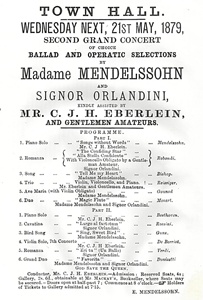
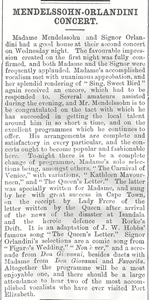
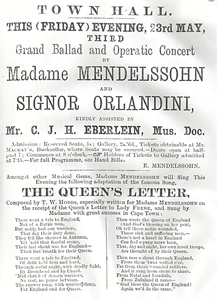
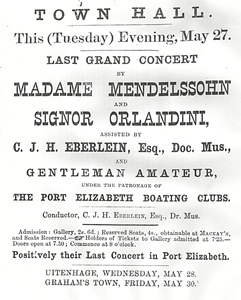
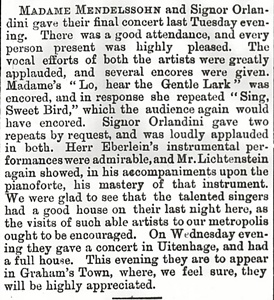
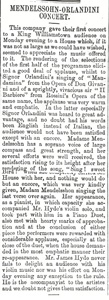
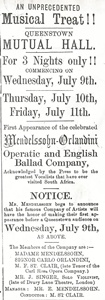
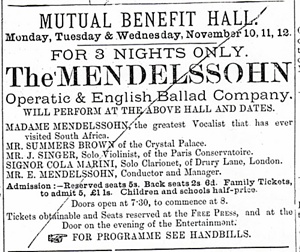

As a fitting end to a pleasant day came the Concert in the Town Hall. Never have we seen the large concert room so full, and the promoters may be congratulated upon the monetary return resulting; the half of which will be devoted to a charitable object, benefiting the Hospital of this town. On Mr CE Stubbs we know a deal of this success depended. He has expended much time, trouble, and knowledge upon the preparation of the various details, which added, formed so attractive and successful an entertainment. To those ladies and gentlemen who gave their services, Queenstown people, so far as we know, and the opinion is freely expressed, do feel grateful for their coming forward so freely to give them two hours enjoyable entertainment; not only on this occation, but on many in the past.
The first part of the programme opened with the Overture Grand March in which Madame Birch and Miss Gammie (piano), Mr Walker (flute) and Mr Sachse (violin) harmonized the instruments under their control exceedingly well. It is always a treat to hear Mr Sachse on the violin. Mr Ernest Brothers, who sang My Sweetheart when a Boy seems to be even improved since last we heard him. A critical remark we once heard will express the general opinion, which is that He has the best tenor voice in the district.
Miss I Gammie is well known to a Queenstown audience; as such we expect to be charmed with her fresh young and cultivated voice. We have not heard any solo by her rendered so tastefully and pleasantly as Years ago Years ago; this to those who have heard Miss Gammie singing is no mean criticism.
We regret that Madame Mendelssohn elected to change Jessies Dream for It was a Dream; only because the former is so great a favourite. Madames voice has lost none of its power, or her mode any of its brilliancy; though it has not been our pleasure to hear her sing for some years past.
It is annoying to think that her second song Lo! Here the Gentle Lark was interrupted by the rude noises made by some idiots at the back of the hall; so much so that Madame Mendelssohn retired from the platform without having finished her song.
We were exceedingly pleased with the Vocal Duet by Madame Birch and Mr Ernest Brothers, Ill think of thee a selection from Verdis opera Il Trovatore. We think selections from operatic works should find an oft repeated place in the programme of Concerts given in the town.
The farce Leave it to me, which occupied the second part of the programme, was acted without a hitch throughout. The acting of the ladies was very good, especially Mrs CM Brothers in the part of Susan Muggins. Mr Joseph Brady as Joe Sprouts was excessively funny; his drolleries and really fine acting kept the audience in roars. Mr Hood as Adolphus Courtley made an excellent walking-gent, ready to do the lover at any degree of strength as ordered by the author.
Mr Stubbs as Mr Easy, the superstitious old genteleman acted capitally in the part where he is in terror of the spirits conjured up by Dr Blinke (Joe Sprouts in disguise); but Mr Stubbs was not a good old man; he was simply Mr Stubbs with a white wig on and a little chalk round the eyes. Mr Tipper was perfect in his short part of Mr Quince; his make up was the best we remember to have seen on an amateur stage.
We hope that the house will be as full on Saturday night, when it is intended to repeat a greater part of this programme, including the farce. The Whittingtons will add considerably to the entertainment and we can promise those who have not seen them, and have the shillings to spare, that they will get good value for their money, and also assist in a good object.
The Whitting Company
We are requested to state that this company, assisted by local talent, will give an entertainment in the Town Hall on Saturday night. The programme is not yet definitely fixed, but we understand Mesdames Mendelssohn and Birch will probably render their assistance.

THE MENDELSSOHN COMPANY
REVIEW QUEENSTOWN FREE PRESS, QUEENSTOWN CAPE COLONY, 14 NOVEMBER 1879
It is very difficult for any one to determine why the visit of this company to Queenstown was, commercially speaking, not a success. In a sarcastic strain it has been remarked that only performing dogs and monkeys will go down with a Queenstown audience. This we take leave to deny, although we freely admit that it is difficult to account for the paucity of attendance at the Mutual Hall this week. To go no further back than the visit of Mr and Mrs George Case some twelve months ago, and we will compare the two entertainments.
The burden of the performances in both instances fell on the ladies, and musically speaking, there can be no question that Madame Mendelssohn is the true artiste. We shall, perhaps, be told that the attraction with Mrs Case was her ability as a comedienne, but on the other hand, apart from the scenic accessories of an opera house, we perceive in Madame Mendelssohn considerable dramatic power, added to a careful cultivation which in a large provincial town at home would be heartily and warmly appreciated.
Then, again, in Mr Case and Mr Singer we have had two of the finest violinists that ever visited South Africa, both of them of a high order of merit so far as finished execution and consummate taste is concerned, and both of them passionately attached to music as an art. As an exponent of the severe classic school Mr Cases rendering of a De Beriots concerto, and Mr Singers delivery of one of Beethovens romances might be evidenced as instances of the highest style of instrumentation, and it would require a very nice judgment to determine which was the most masterly performance. Mr Case played to a crammed house, whereas not more than half a house at any time listened to Mr Singer.
As we have before remarked, Madame Mendelssohns vocalization is of a high order, her trills and shakes being carefully executed. In fact this is her style, and it does not by any means follow that a lady who can trill through Gantzs Sing, Sweet Bird with almost faultless execution, could sing with effect Kathleen Mavourneen. Fully acknowledging that everything she did was done well, we have no hesitation in asserting that De Bragas Serenade, The Angels Sang with the glorious violin obligato, so admirably played by Mr Singer, together with a charming accompaniment by Mr Sawerthal was one of the most delightful musical treats ever heard in this town.
Mr Summers Brown, who has a pleasing voice and manner was best heard inthe Diver, a fine baritone song. Throughout the three performances Mr Sawerthal played the accompaniments with much ability.

CONCERT REVIEW PUBLISHED IN THE STAR NEWSPAPER, JOHANNESBURG, 5 APRIL 1889
CONCERT
A grand concert was given in the Globe Theatre on Wednesday evening, in aid of the Johannesburg Nurses Home under the patronage of Captain and Mrs von Brandis and the medical gentlemen of Johannesburg. The handsome theatre was crowded with a most distinguished and enthusiastic audience, and great praise is due to the Committee of Ladies and the Chairman (the Rev. Mr Darragh) in taking so much trouble in placing before the public such a musical treat and in combining the same with so good and well chosen a cause.
The opening piece in Part I of the programme was the Overture La Couroupe Dor by Herman, played by the excellent string and brass band of the Wanderers Club, under the able conductorship of Mr Francis Crane. Mr P de Jongh next followed with Watsons ballad Love Knots which was slightly marred by the incessant heavy downpour of rain, which came pattering on the roof.
In Part II this gentleman gave Stephen Adams popular song, The Maid of the Mill and to a well-merited encore sang Thy voice is near me. Mr de Jongh well sustained his reputation as one of the best singers in Johannesburg. The third piece on the programme, Little Snowdrops (Abts Cantata), was sweetly rendered by Miss Impey, with orchestral accompaniment by the band. The first appearance of this lady was greeted with much applause, and we trust to frequently hear her at concerts, of which we regret so few are given in Johannesburg.
The violin solo, which was next on the programme, was a Nocturne, by J Field; it was played with great spirit by Mr P Proost, who also made his first debut in public.
Mrs. Mendelssohn, one of the leading patronesses of the musical art on the Randt, followed with Ardittis sweet and ever popular Il Bacio, and as an encore rendered with much finish Sing, sweet bird. In Part II, Ganzs The Nightingales Trill, this lady received well-merited and most vociferous applause.
The cello solo, the sixth piece on the programme, Hungarian dance, by Dunkler, was played by Mr Israel with the finish of a professional artist. This gentleman has received so many eulogies from the press of the Cape Colony, that we can add but little to its praise.
Gounods Ave Maria, with cello and organ obligato, by this gentleman and Mrs. Mendelssohn, in Part II, was listened to with rapt attention, bestowed by an appreciative and musical audience upon a really excellent production. The closing piece of the first part of the programme was Millockers One tender kiss and Sall I boldly undeceive her? (Beggar Student), - a grand duet by Mrs Mendelssohn and Mr P de Jongh.
The opening piece of Part II was Conradis Berlin wie es weint und Lacht, by the full orchestra of the Wanderers Band, which was played with finish and precision. The better land, by Cowen, with the charming words by Mrs Herman, was sung by Miss Kate Rockey, whose powerful, sweet and sympathetic voice carried the audience away, and a well-merited and enthusiastic encore rewarded this ladys very effective rendering of the song.
Mr P Proost followed with a violin solo, a selection from La Trovatore arranged by Singele. The famous duet from Wallaces chef douvre Maritana O, Maritana, was delightfully rendered by Mrs Mendelssohn and Mr de Jongh. The programme was brought to a finale by the Wanderers Club orchestra playing in good time and precise execution the lily of the North waltz, by Marriot.
This very excellent and successful concert has shown us that Johannesburg ranks as one of the forefront towns in South Africa regarding musical talent and ability, and we should like to see some institution started during the coming winter months for the propagation of this most delightful art. Some energetic members of our community should take up this matter at once, as no art is more conducive to the refinement of taste generally than is that of music.

Rumour has it that Caroline was known in the new mining town of Johannesburg as the Australian Nightingale, and part of the story is that she used to walk through the markets singing! However it has not been possible to confirm these stories at this stage.
Although the following pictures do not relate directly to Caroline's concerts, they reflect ongoing musical activity in the rapidly-growing mining town of Johannesburg in 1898 as reported in the Standard and Diggers News owned by Emanuel Mendelssohn, Caroline's husband.
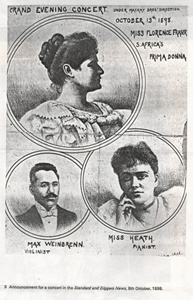



Silver Wedding
Monogrammed letterhead with CM and address: 5 Belsize Grove, Hampstead. N.W. 3 January 1900
Meine Gute Julie -
Many thousands thanks for ALL your and the dear children's attention for my "Silver" Wedding God Bless and spare you all for 100 years Omine and you can think how my poor heart did suffer and pain me on THAT day SIGH after SIGH and very hot tears ran down my cheeks and now dear old Anna if YOU were only here I would squeeze you into an Irish stew also that dear sister of yours Paula which you can tell her from me WHAT work really I've not seen ANYTHING EVER like it, too lovely for me to find words to tell you - but my heart can never express from my mouth WHAT I FEEL for your dear Mother and you girls. Eva DON'T know also what to say about your both wants but P. God some day and one day I WILL also do something that will surprise you all, BUT NEVER MIND - Again with my DEEPEST depths of my heart let me take you all and cuddle you till you can't take your breath - God Bless and spare you in the BEST of God's blessings Good Health from
Aunt Carrie
1906







"Manny's" Death
74 Broadhurst Gardens
DO WRITE to me Anna and tell me all about Eva & your both babies God bless them., has Eva's husband come out to her yet? tell me how you ALL ALL are over there. I hope you and Eva will let me know when Eva comes to London - when she is going back to Africa & how is good Tinka is she going out with them - I hope so for her own sake. I DO LIKE TINKA - A GOOD CREATURE.
Fondest love to GELIEBTE Mutterchen, Eva, Heinrich, Jack, Tinka with TONS of Kisses to the babies from poor poor
Aunt Carrie
Dollie sends love to all
Don't dear Anna keep me waiting a month for an answer.
XXXXXXXXXX

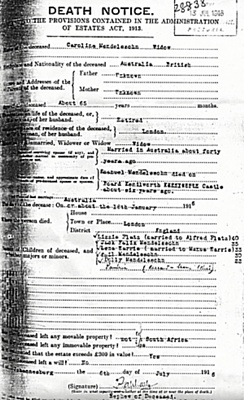

Extract from Chapter 6 by James and Kate Hyde, of 1969 book (published in Pretoria?) edited by L. Wolpowitz: Concerts: Vocal and Instrumental, Choral, Chamber Music, Orchestral
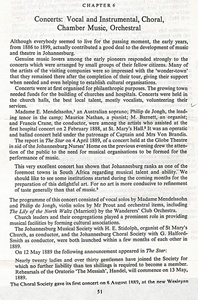
Her second daughter, my grandmother Paulina, married Charles De Saxe in London in 1897, and the young couple migrated to Melbourne, where many of Charles brothers and uncles had gone to settle many years before. Their son Morris Isaac, who was my father, was born there in 1898.
Paulina died in Melbourne at the age of 25 in 1902, and Morris ended up in the care of relatives in South Africa around 1910, while his father Charles returned to England to live, marrying a second time there. Morris died in Johannesburg in 1930 at the age of 31. A second son of Charles and Paulina, Wilfred Emanuel, seems to have disappeared without trace somewhere between 1905 and 1910. There are, to date (2007) no death certificates to be found recording his death.

Although I have a fair amount of information on the Emanuel family from people I have been in touch with in Australia since 1978, I have so far been unsuccessful in finding any photos of the Emanuel family, particularly of my great-grandmother Caroline Mendelssohn, born Emanuel.
Dr Ann Mitchell was an archivist at Monash University and saw my web pages on family history of the Mendelssohns, and contacted me, giving me information about Lizette Bentwitch, whose mother, Elizabeth Bentwitch, was born Emanuel, and was my grandmother, Paulina De Saxe's aunt.
As a consequence of Dr Mitchell's information, I was able to download this miniature of Lizette Bentwitch and Sir John Monash from the Monash University Archives.

Lieut-General Sir John Monash GCMG, KCB, VD and Miss Lizette Bentwitch 1927
watercolour on ivory
87 x 106 mm.
signed by the artist, Agnes Paterson
exhibited Victorian Artists Society April 1927, April 1928 and April 1931
The intense personal relationship that existed between John Monash and Lizzie Bentwitch was no secret to the Melbourne society of their day or since. It was discreetly documented by the late Geoffrey Serle in his superb biography of Monash published in 1982 with the full support of the Monash family. Whilst press photographs of the two together are known to exist, the miniature is a truly unique example of John Monash iconography. The very existence of a double portrait represents a clear statement of intent by a couple in every sense except name. The story of how it came to survive cannot yet be told.
Research is in progress into the life of Elizabeth Bentwitch and her remarkable extended family, staunch Zionists, many of whom participated in the re-settlement of Jews in Israel after the First World War.
In addition, we are trying to establish what happened to two companion pieces - singleton portraits of Monash and Bentwitch - the former certainly by Paterson and the latter probably so, though Lizzie was said to be a miniaturist of some skill herself.
Missing Miniatures | Agnes Paterson | Sir John Monash Exhibition | Records and Archives Services | Monash University


At last! A photo of Caroline Mendelssohn (born Emanuel) which was sent to me from South Africa on 8 April 2008, and as a bonus, the whole family, Caroline, Emanuel, Lizzie, Paulina, Jack, Lena, Dolly, Emil. They may not be in the correct order, and I will amend if I receive further information. The identity of the four women with white caps and aprons has also not been disclosed at this stage.
When the book arrived on 14 April 2008 I was able to see how this photo was captioned and identify all the members of my family.
The caption reads:
With their servants on either side, this Mendelssohn family group was photographed in the garden of their home in Belsize Grove, Hampstead, London, possibly in 1896 when Mendelssohn visited England. Left to right, standing, Caroline and Emanuel Mendelssohn, and their elder son, Jack, then aged about 14; seated, Lena; Pauline (sic); Lizzie, with her arm around Dolly, born 1892 in Johannesburg and, seated on the ground, Emil. Dolly related how 'Madame Mendelssohn', as she called herself, once took her to an opera and, to her acute embarrassment, stood up and started singing the aria with the soprano on the stage 'because she could sing it better'!By courtesy Mrs Cecilia (sic) Raphaely
(Page 83 in Founders and Followers - Johannesburg Jewry 1887-1915 edited by Mendel Kaplan and Marian Robertson)

Interesting pieces of family history come to light when one least expects them - and I have just been sent the following from Johannesburg:
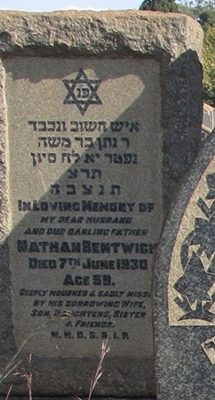
Photo courtesy Derek Walker who took this photo at Brixton Cemetery in Johannesburg, May 2012





Details of extracts from Caroline Mendelssohn's bound volume of music she used to sing from - sent by Matthew Jelf from London.

CHAPTER 1: MENDELSSOHN FAMILY PART 1
CHAPTER 2: MENDELSSOHN FAMILY PART 2
CHAPTER 6: THE STORY OF MORRIS (DE SAXE)

Mannie and Kendall Present: LESBIAN AND GAY SOLIDARITY ACTIVISMS
RED JOS: HUMAN RIGHTS ACTIVISM
Activist Kicks Backs - Blognow archive re-housed - 2005-2009
RED JOS BLOGSPOT (from January 2009 onwards)

Genealogy only Copyright ©: De Saxe Family
This page updated 16 DECEMBER 2013 and again on 25 OCTOBER 2016
PAGE 9